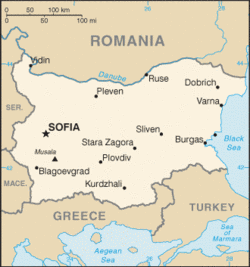Welcome to the Virtual Education Wiki ~ Open Education Wiki
Bulgaria: Difference between revisions
(→Bulgaria in a nutshell: picture added) |
Ann Fastré (talk | contribs) mNo edit summary |
||
| Line 128: | Line 128: | ||
== References == | == References == | ||
[http://eacea.ec.europa.eu/education/eurydice/documents/eurybase/national_summary_sheets/047_BG_EN.pdf Eurydice National Overview on Educational Systems] <br> | |||
---- | ---- | ||
[[ | >> [[Countries]] <br> >> [[Main_Page]] | ||
[[ | |||
[[Category: | [[Category:Bulgaria|Bulgaria]] [[Category:Europe]] [[Category:European_Union]] [[Category:Countries_with_Programmes]] | ||
Revision as of 13:26, 13 June 2012
Partners situated in Bulgaria
None.
Bulgaria in a nutshell
Bulgaria (Bulgarian: България, transliterated: Balgariya), international transliteration Bălgarija, officially the Republic of Bulgaria (Република България, Republika Balgariya) lies in the Balkans in south-eastern Europe. It borders five other countries: Romania to the north (mostly along the River Danube), Serbia and the Macedonia (the country) to the west, and Greece and Turkey to the south. The Black Sea defines the extent of the country to the east.
Bulgaria has a population of approximately 7.6 million.
Bulgaria functions as a parliamentary democracy under a unitary constitutional republic. It is a member of the European Union since 2007 and of NATO since 2004.
Bulgaria education policy
Bulgaria education system
The Bulgatian education system is divided into 4 stages:
- primary
- secondary
- high school
- university
Primary education
Schools are mandatory as an age of 6 or 7. Students learn some of the basic subjects like for example witting, reading maths, history etc.
Secondary School
The next step is secondary education where each student can choose some of the subjects.
In this stage of the educational process a student is prepared enough to decide what he or she is interested in. There are mathematical, social, economic schools. This stage is mandatory.
After graduating from secondary school most of the students take a special exam in order to study in special High School.
High School
This is the most important stage from the whole education system but it is not mandatory. Students cannot go to a university if they do not have the High School Certificate.
Students can choose in what kind of high school they want to study and they are obliged to take the corresponding exam. There are Maths High School(they are the most popular), Language High school and so on.
University
This is the biggest step for the whole education is the University.
In order to have the ability to study in university students must have the High School Certificate with good to excellent result and also they must take one or more exams. There are almost all kinds of universities - some of them are national and other are international-class. All the universities are require fees to be paid.
Private schools
In Bulgaia there are also some private schools but only a small percentage of the students can afford to study there because they are very expensive.
Higher education in Bulgaria
Universities in Bulgaria
(sourced from http://en.wikipedia.org/wiki/List_of_universities_in_Bulgaria)
- American University in Bulgaria
- National Academy for Theatre and Film Arts
- Medical University of Pleven
- Medical University of Plovdiv
- Medical University of Sofia
- Medical University of Varna
- National Sports Academy
- National Military University
- Nikola Vaptsarov Naval Academy
- New Bulgarian University
- Plovdiv University
- Rakovski Defence and Staff College
- Rousse University
- Sofia University
- South-West University "Neofit Rilski"
- Technical University of Sofia
- Technical University of Sofia - Branch Plovdiv
- Technical University of Varna
- Technical University of Gabrovo
- Trakia University - Stara Zagora
- Veliko Tarnovo University
- Civil engineering university "Lyuben Karavelov"
- University of Architecture, Civil Engineering and Geodesy
- University of Forestry
- University of National and World Economy
- University of Economics Varna
- University of Shumen Episkop Konstantin Preslavski
- University of Mining and Geology
Polytechnics in Bulgaria
Higher education reform in Bulgaria
The Bologna Process
Administration and finance
Quality assurance in Bulgaria
Bulgaria's HEIs in the information society
Towards the information society
Most information published in this entry, is based and kopied out of a document, received on 24/08/2009 from Assoc. Prof Angel Smrikarov, Vice Rector University of Rousse And Coordinator of Bulgarian Virtual University . This information is also available in Bulgarian at: http://www.bvu-bg.eu/index.php?Clip=proekt
In 1992 in response to the initiative for “Electronic education” of the European Commission, THE NATIONAL PROGRAMME FOR CREATING VIRTUAL EDUCATION SPACE was started in Bulgaria. The Programme was funded chiefly by the Ministry of transport and Communications, as well as The Ministry of Education and Science. The PILOT VIRTUAL DEPARTMENT IN COMPUTING “JOHN ATANASSOV” was established, which a year later extended into the VIRTUAL FACULTY OF INFORMATION AND COMMUNICATION TECHNOLOGIES. At the end of 2004, under the initiative of the Chairmen of the Council of Rectors, the Bulgarian Academy of Sciences, the Higher Certifying Committee, The Union of Teachers, the Federation of the Unions of Scientists, the Bulgarian Association of information technologies and other educational, research and business organisations the BULGARIAN VIRTUAL UNIVERSITY was established. The founding agreement of this formation was signed by the Rectors of 37 Universities and the Directors of 27 Institutes of the BAS.
Information society strategy
Virtual initiatives in HE in Bulgaria
Bulgarian Virtual University
The Bulgarian Virtual University (BVU) was launched in 2004 as a a nation-wide portal to Bulgarian higher education institutions and their online learning environments. It followed naturally from the establishment of a nationwide "iUniversity" programme, funded by Bulgaria's Ministry of Transportation and Communications, designed to help Bulgaria implement ICT more effectively in its educational processes. The iUniversity first established 100 computer laboratories for e-learning at Bulgarian universities and research institutions, then established the Bulgarian Virtual University.
References
Eurydice National Overview on Educational Systems
